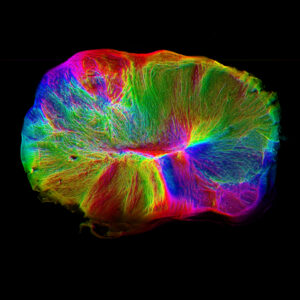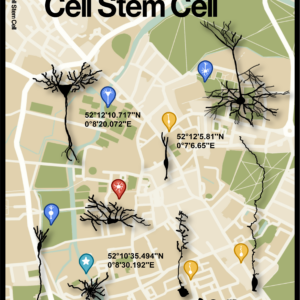
Cerebral organoid at the air-liquid interface with long-range axon bundles color-coded by their directionality.
Research in the Lancaster lab is aimed at the study of human brain development. We do this by making use of an in vitro model system called cerebral organoids. These 3D self-organising neural tissues develop from human pluripotent stem cells and model many key aspects of early human brain development. Furthermore, they can accurately model a variety of neurodevelopmental disorders such as microcephaly. The goal of our research is to understand the mechanisms underlying human brain expansion. We are interested in this from an evolutionary perspective, but also in an effort to shed light on pathogenesis of neurodevelopmental disorders that affect brain size determination.



